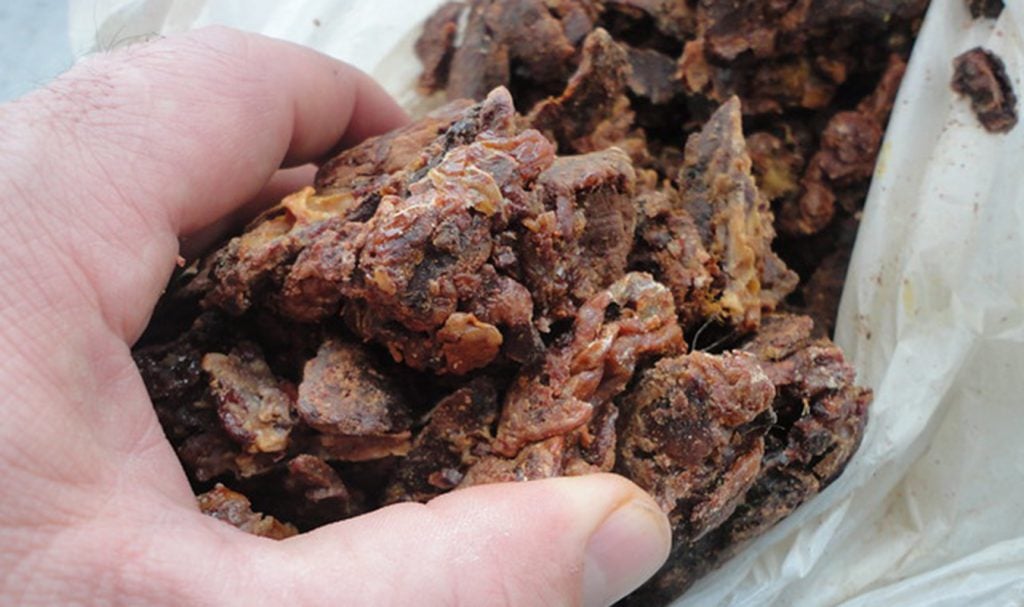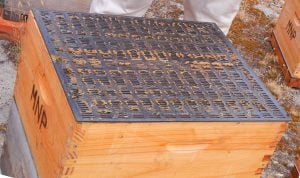
Propolis is produced by honey bees from saliva, beeswax and plant exudes. Propolis has antibacterial properties and can serve as an ‘external’ immune system for the colony, helping to prevent microbial or fungal growth in the hive. Honey bees also use it to plug holes and ‘cement’ honey frames to the colony, which can help waterproof hive walls and provide structural stability.
Propolis production in a hive can be influenced by the strain of honey bees as well as the type of flora in the area. Much of the research into propolis production has centred on European plant, while very little is known about Australian propolis producing plants.
Ancient Egyptians, Assyrians and Greeks used propolis in traditional medicines. There is an emerging market for propolis for use in cosmetics and alternative medicines and some medical studies have demonstrated efficacy.
The AgriFutures Australia Honey Bee and Pollination program commissioned a report into the viability of a propolis market in Australia.
Production
Propolis can be obtained by scraping it from supers and frames. Alternatively, propolis mats can be placed in the hive. Propolis mats start at around $8.00 each. Once they are full the propolis can be scraped off in cold weather (23oC) or frozen first before scraping. You can expect to yield approximately 150-200g per hive per year. Cooler areas and areas with specific floral compositions, such as native sedge grasses, tend to produce more propolis. Propolis extraction is a complex process.
Price
Raw propolis is worth $33-197 per kilo in New Zealand, depending on test results or processed propolis yield. The New Zealand industry is worth approximately $3.75 million. The New Zealand market is highly developed, with propolis processors offering a propolis mat drop-off and pick-up service.
An operation with 100 hives could yield an extra $900 per year if paid labour is used and $1400 if the owner’s labour is used.
The Australian market is currently small and underdeveloped. Propolis was the second fastest growing dietary supplement in Australia in 2016-2017. By 2022 it is forecast that propolis sales in Australia will be $40 million.
Why take up propolis production?

Propolis mat
Source: www.kibenatural.com
- Increased income
- No loss of honey or pollination income
- Limited labour required
- Easily incorporated into existing operations
- Estimated net revenue of $8.90 per hive per annum
What is needed to establish the market?
- Unambiguous labelling to differentiate Australian-produced propolis from imported propolis
- The establishment of a large-scale processor and commercial value chain
- Agreed quality standards
- Marketing research and consumer surveys
- Market development
- Further research into floral types that produce propolis with high flavonoid levels
- Research into the unique characteristics of propolis produced by native Australian plants
Additional resources:
Acknowledgements:
- M Clarke (2019) Market and Production Potential for Australian Produced Propolis. AgriFutures Australia Publication No 19-022, Canberra ACT
- This article was reviewed by Danny Le Feuvre and Sam Malfroy.
- About the author Nadine Chapman


One comment, add yours.
Kevin Oh
To whom It may concern
I trust this message finds you well. My name is Kevin, and I represent Nature’s Key Pharmaceutical. We are currently exploring the possibility of producing propolis capsules using propolis sourced from Australia, as opposed to Chinese origin.
We are interested in procuring a substantial quantity of high-quality propolis that meets our specifications for the production of health supplements. Could you please provide information on the availability of Australian-produced propolis for bulk purchase? Additionally, we would appreciate details on pricing, lead times, and any quality assurance measures in place.
Furthermore, we are keen to know if your propolis is currently utilized in the health supplement industry. Understanding its existing applications and market presence will assist us in making informed decisions.
We believe that establishing a partnership with your company could be mutually beneficial. We look forward to the possibility of collaborating with you on this venture.
Thank you for your time and consideration. I anticipate your prompt response.
Best regards,
Kevin Oh